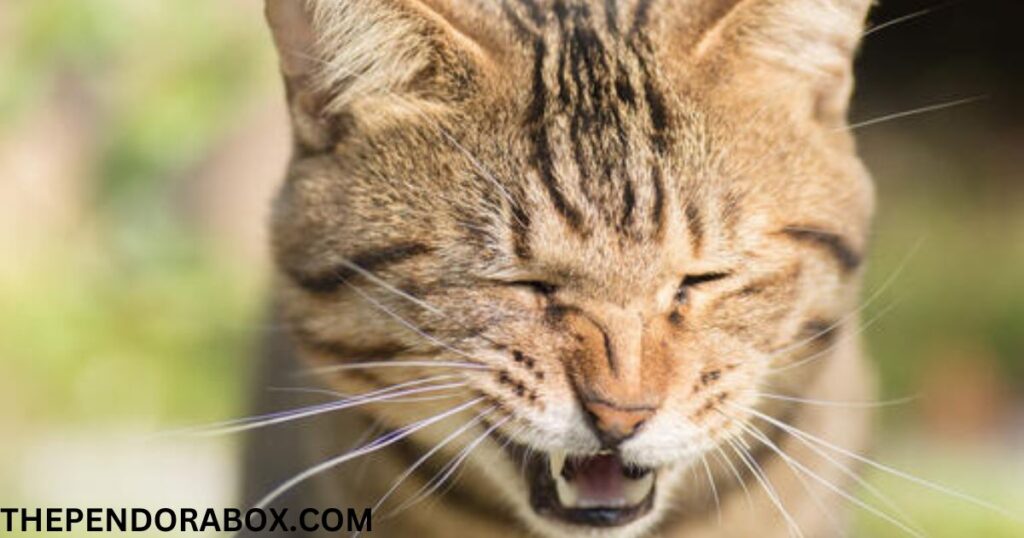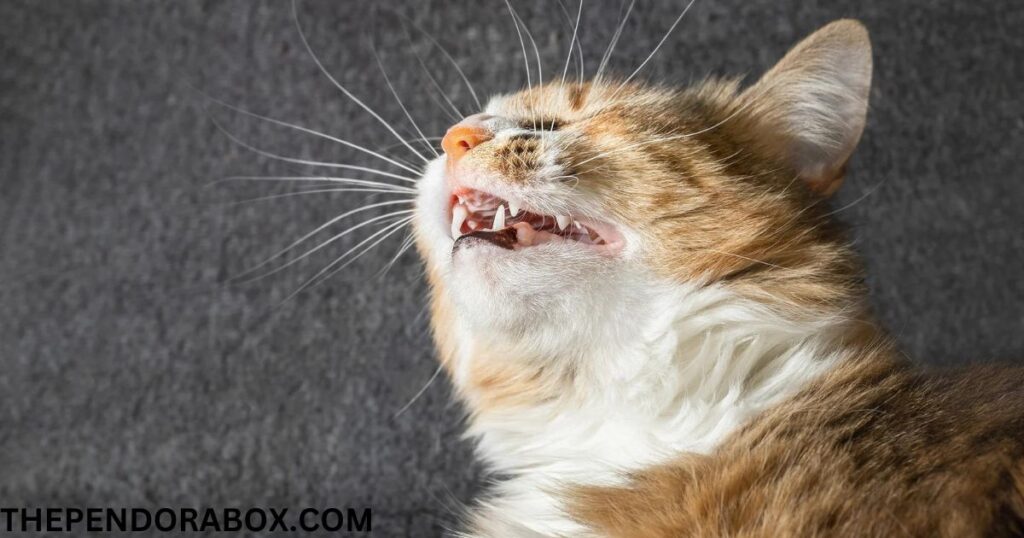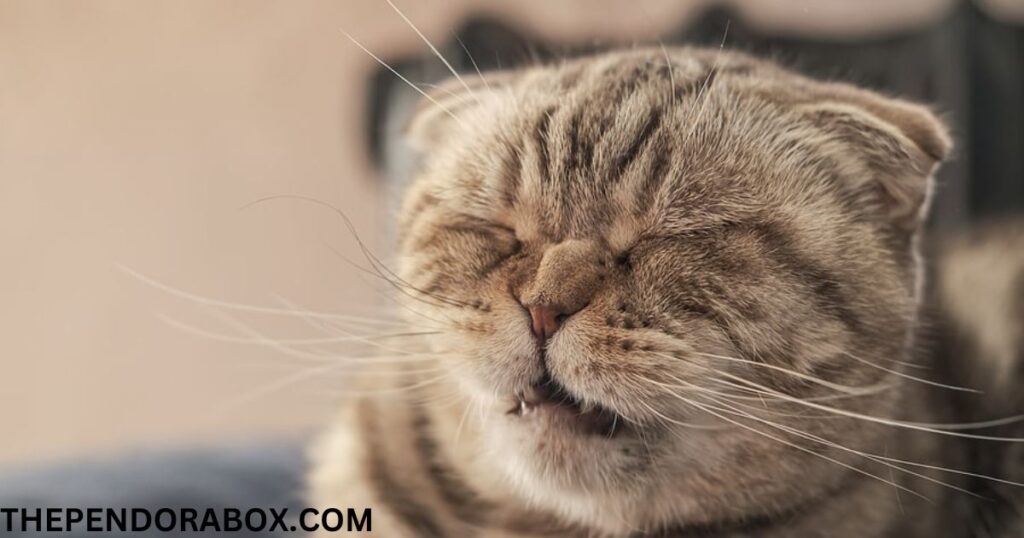As a pet parent, you might have seen your cat sneezing a lot lately. An occasional sneeze is normal, but frequent sneezing could mean something’s wrong. Knowing why your cat sneezes is key to helping them feel better.
Cats sneeze for many reasons, like viruses, bacteria, or allergies. They might even sneeze if something is stuck in their nose. Finding out what’s causing your cat’s sneezes helps you treat the problem. This article will look at why cats sneeze and how to help them.
What Causes Sneezing in Cats?
Sneezing in cats can be caused by many things. But, viral and bacterial infections are the top reasons. These infections can make a cat’s nose feel irritated, leading to sneezing a lot.
Viral Infections
Feline viruses like herpesvirus and calicivirus can make cats sneeze. These viruses can make a cat’s nose and upper airways inflamed. This causes sneezing and other symptoms like runny eyes, nasal discharge, and fever.
Bacterial Infections
Bacterial infections cats can also cause sneezing. Conditions like Bordetella and Chlamydia can infect a cat’s airways. This leads to upper respiratory disease. Cats with bacterial infections may also cough, feel tired, and lose their appetite.
Knowing why cats sneeze is key to helping them feel better. By treating viral or bacterial infections, we can ease our cat’s discomfort. This helps prevent the problem from getting worse.
Upper Respiratory Tract Diseases
Upper respiratory tract diseases, like rhinitis and sinusitis, can make your cat sneeze a lot. These conditions cause inflammation and irritation in the nasal passages. This leads to sneezing that doesn’t stop in cats. It’s important to know what causes these diseases and their symptoms to help your cat.
Rhinitis is an inflammation of the nasal passages that makes cats sneeze. It can be caused by viruses, bacteria, allergies, or even objects in the nose. Sinusitis, or inflammation of the sinuses, also causes sneezing and nasal congestion in cats.
Finding out why your cat is sneezing is the first step to help them. Viral or bacterial infections might need special treatments. Allergies or environmental triggers can be managed with lifestyle changes and medication. Sometimes, sneezing can mean a serious health issue like a tumor or nasal passage problem.
If your cat’s sneezing doesn’t stop or is very bad, see a vet. They can do tests, examine your cat, and give the right treatment. This will help your cat feel better and breathe easier.

Allergies and Environmental Triggers
Allergies and environmental factors can make cats sneeze. Cats might react to dust, pollen, and certain cleaners. These can irritate their noses and lead to sneezing. Knowing what causes these sneezes is key to helping your cat.
Dust and Pollen
Cats often have allergies to dust and pollen, leading to sneezing. Dust mites in carpets and furniture can make cats sneeze. Pollen from plants outside can also irritate their noses, especially when seasons change.
Keeping your cat’s area clean and using air purifiers can help. This reduces their exposure to cat allergies.
Household Cleaners
Many cleaning products can irritate a cat’s sensitive nose. Strong smells from cleaners can make cats sneeze. Choose natural, scent-free cleaners and make sure rooms are well-ventilated.
This helps protect your cat from the effects of household cleaner allergy cats.
Why Is My Cat Sneezing: Common Causes
If your cat is sneezing a lot, it’s key to know why. Cats sneeze for many reasons, like viruses or allergies. Knowing the cause helps you care for your cat better.
Viral infections are a big reason for cat sneezing. The common cold or feline herpesvirus can make cats sneeze a lot. These viruses spread fast among cats.
Bacterial infections can also make cats sneeze. Sinusitis or rhinitis can irritate the nose, causing sneezing. These infections might come after a virus or from the environment.
Some diseases, like chronic rhinitis or nasal polyps, can also cause sneezing. These conditions make breathing and sneezing hard for cats.
Allergies to things like dust or pollen can also make cats sneeze. Finding and removing the allergen can help your cat feel better.
Knowing why your cat sneezes helps you and your vet find the right treatment. This can make your cat more comfortable and prevent problems from getting worse.
Foreign Body Obstructions
Cats can sneeze because of foreign body obstructions. These happen when they swallow objects or irritants that get stuck in their noses. This can cause inflammation and lead to sneezing fits.
Ingested Objects
Cats, being curious, might swallow small things like toy parts, strings, or small bones. These can get stuck in their noses. This irritation makes them sneeze a lot as their body tries to get rid of the object.
Nasal Irritants
Cats sneeze when they have nasal irritants like dust, pollen, or cleaning products. These can make their nasal passages inflamed, causing sneezing and discomfort.
If you think your cat has a foreign body obstruction or has been exposed to irritants, get vet help fast. The vet can find out what’s wrong and treat it. This is important to keep your cat healthy and happy.

Chronic Sneezing in Cats
Some cats sneeze more than others. This can be a sign of health problems that need a vet’s help. Knowing why your cat sneezes a lot is important for their care.
Recurring Infections
Cats with weak immune systems often sneeze a lot. These sneezes can be from viruses or bacteria. Getting the right treatment from your vet is crucial for cats with recurring infections.
Underlying Health Issues
Chronic sneezing in cats can also mean there’s something serious going on. This could be allergies, polyps, or even cancer. Finding and treating the real cause is key. Regular vet visits can help find and fix underlying health issues that cause sneezing.
Diagnosing the Cause of Sneezing
Finding out why a cat sneezes often needs a detailed vet check. The vet will look at the cat’s symptoms and health history. They might do physical checks, tests, and even imaging studies.
The vet will carefully check the cat’s nose, sinuses, and breathing system. They look for signs of infection, swelling, or blockages. They might take swabs or blood tests to find out if there’s a virus, bacteria, or fungus causing the sneezes.
They might also suggest X-rays or CT scans. This helps see the cat’s nasal and sinus areas better. It can show things like polyps, tumors, or objects that could be making the cat sneeze a lot.
By doing a full veterinary examination, the vet can figure out why the cat is sneezing. Then, they can make a plan to help the cat feel better.
Home Remedies for Sneezing Cats
While it’s key to see a vet for ongoing or bad sneezing in cats, some home fixes can help. Knowing why your cat sneezes can guide you to simple ways to ease their breathing.
Humidifiers and Steam
Dry air can bother a cat’s nose and make sneezing worse. A humidifier can add moisture to the air, easing their discomfort. Also, letting your cat breathe in steam, like in a bathroom during a hot shower, can help clear out mucus and ease congestion.
Nasal Decongestants
Your vet might suggest over-the-counter nasal decongestants for sneezing cats. These can lessen swelling and inflammation in the nose, offering temporary relief. But, always check with your vet before giving your cat any medicine.
Keep in mind, home remedies might help a bit, but if your cat’s sneezing doesn’t get better or gets worse, they need a vet’s help. A vet can give the right diagnosis and treatment plan to keep your pet healthy and happy.

When to See a Veterinarian
If your cat sneezes for more than a few days or gets worse, you should see a vet. This could mean there’s a serious health issue that needs quick attention.
Also, if your cat sneezes and has other symptoms like runny eyes or nose, or if they seem tired or don’t want to eat, take them to the vet. These signs can mean a bigger problem that needs a vet’s help.
A vet can find out why your cat is sneezing and help fix the problem. They might do tests like physical checks, blood work, or scans to figure out what’s wrong. Then, they’ll make a plan to help your cat get better.
Getting veterinary care for cat respiratory issues is key to keeping your cat healthy. Quick action can help your cat feel better and avoid bigger problems.
Preventing and Managing Cat Sneezing
To keep your cat healthy and sneeze-free, you need to act early. Make sure their environment is clean and free of dust. Avoid using harsh cleaners and treat any health issues quickly. Regular vet visits are key to catching problems early.
Reducing irritants is vital in preventing sneezing. Keep your home well-ventilated and use natural cleaners. Also, grooming your cat often can help remove fur that might cause sneezing.
For cats who sneeze a lot, consider an air purifier or humidifier. These can improve the air quality and help with breathing. Also, vacuum and clean surfaces often to reduce sneezing triggers.
Sometimes, sneezing can be a sign of a bigger health issue. This could be an infection, allergies, or something stuck in their nose. Regular vet visits can help find and treat these problems.
By taking steps to prevent and manage sneezing, you can help your cat breathe better. Focus on keeping their environment clean and working with your vet. This will keep your cat’s respiratory system healthy.
Conclusion
Understanding why cats sneeze is key to helping them feel better. Causes include viruses, bacteria, allergies, and getting something stuck in their nose. Working with your vet and taking steps to prevent sneezing can help a lot.
This article has given you a detailed look at why cats sneeze and how to stop it. You now know how to tackle sneezing in cats. This includes treating health issues and using home remedies to keep your cat happy and healthy.
It’s important to catch sneezing early and treat it quickly. Being watchful and taking action can keep your cat comfortable and healthy. With the right steps, your cat can live a happy and sneeze-free life.
FAQ
Why is my cat sneezing?
Cats sneeze for many reasons. This includes viral and bacterial infections, upper respiratory diseases, and allergies. Environmental factors like dust and cleaners can also cause it. Sometimes, something stuck in their nose can make them sneeze too.
What are the common causes of sneezing in cats?
Cats sneeze for several reasons. Viral infections like feline herpesvirus and calicivirus are common. Bacterial infections, such as Bordetella and Chlamydia, can also cause it. Allergies to things like dust, pollen, and cleaners are another reason. Foreign objects in their nose can also trigger sneezing.
Can upper respiratory tract diseases cause sneezing in cats?
Yes, diseases like rhinitis and sinusitis can make cats sneeze a lot. These diseases cause inflammation and irritation in the nasal passages.
Can allergies and environmental factors contribute to cat sneezing?
Yes, cats can be allergic to things like dust, pollen, and cleaners. These allergens can irritate their nasal passages and make them sneeze.
Can foreign body obstructions lead to sneezing in cats?
Yes, sneezing can happen if something is stuck in a cat’s nose. This could be something they ate or an irritant. It can cause inflammation and lead to sneezing.
Can cats experience chronic or persistent sneezing?
Yes, some cats sneeze a lot because of ongoing health issues. This could be due to recurring infections or other medical problems.
How can I diagnose the cause of my cat’s sneezing?
To find out why your cat is sneezing, a vet needs to examine them carefully. They might do tests and imaging studies. The vet will look at your cat’s symptoms and medical history to figure out the cause.
What home remedies can help with cat sneezing?
For mild sneezing, you can try a few things at home. Using a humidifier can help keep the air moist. Steam inhalation can also help. Your vet might suggest over-the-counter nasal decongestants to clear out congestion.
When should I take my cat to the veterinarian for sneezing?
If your cat’s sneezing doesn’t go away or gets worse, take them to the vet. Also, if they have discharge, seem tired, or don’t want to eat, it’s time to see a vet. They can find out what’s wrong and treat it.
How can I prevent and manage cat sneezing?
To prevent and manage sneezing, keep your home clean and dust-free. Avoid using harsh cleaners. Also, make sure your cat’s health is good. Regular vet visits can help catch any respiratory problems early.

